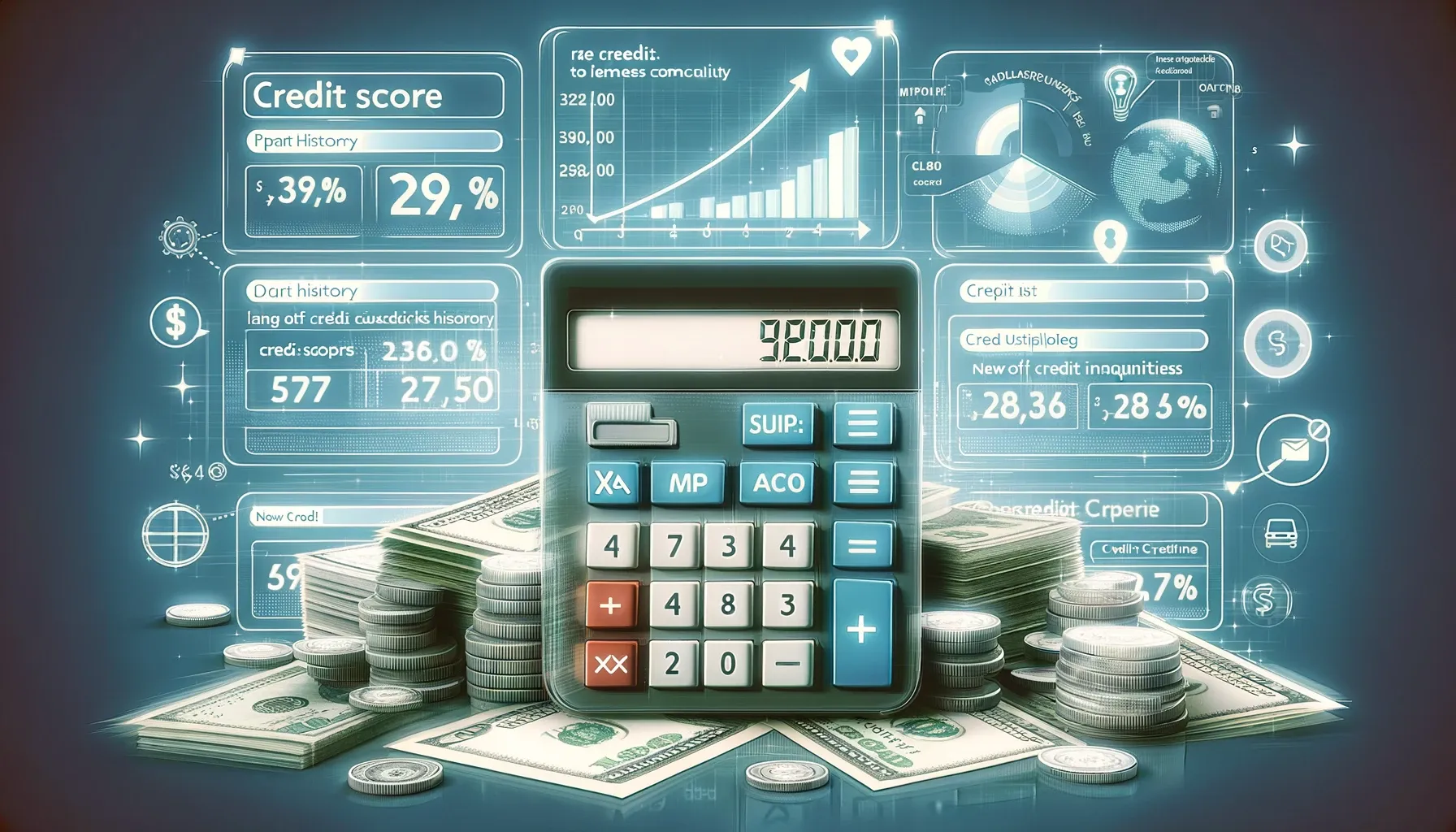How Credit Scores Are Calculated
Short Answer
Credit scores are calculated based on several factors including payment history, credit utilization, length of credit history, types of credit accounts, and new credit inquiries.

Have you ever wondered how credit scores are calculated? What factors are considered and how do they impact your overall score?
Understanding the inner workings of your credit score calculation is essential for managing your financial health. Whether you're looking to improve your credit score or maintain a good one, delving into the world of credit scoring is a must.
Many people believe that income or employment history plays a significant role in determining credit scores. However, the reality is quite different. Credit scores are not based on your income or job status. Instead, they are primarily calculated based on your credit report information.
So, what are the key factors that affect your credit score? How do payment history, amounts owed, length of credit history, new credit, and credit mix come into play? Let's explore the fascinating world of credit score calculation and uncover the secrets behind those three-digit numbers.
Key Takeaways:
- Your credit score is a crucial number that can greatly impact your financial life. It determines your ability to get approved for loans, the interest rates you'll receive, and even your chances of renting an apartment or getting a job.
- Understanding the determinants of credit score is essential in managing your financial health.
- The key factors that affect your credit scoring process include payment history, amounts owed, length of credit history, new credit, and credit mix.
- Understanding how these factors are weighted in credit score calculation can help you make informed financial decisions and improve your score.
- Regularly checking your credit report and disputing any errors can ensure the accuracy of your credit score.
- Implementing good financial habits such as making on-time payments and keeping your credit utilization low can help improve your credit score over time.
- Factors affecting credit score are calculated using information from your credit report, not your income or employment history.
One of the key credit score determinants is payment history. Paying your bills on time and in full is the most important factor. Late payments, defaults, or bankruptcy can significantly lower your credit score. Another significant determinant is credit utilization, which refers to the amount of credit you're using compared to your available credit. Higher utilization ratios can negatively impact your score.
Credit mix also plays a role in credit score calculation. Lenders want to see a mix of different types of credit, such as credit cards, mortgages, and auto loans, as it demonstrates your ability to manage different types of debt responsibly. Length of credit history is also considered, with longer histories generally seen as more positive.
The credit scoring process involves using various methods to calculate your credit score. The most commonly used method is the FICO score, which takes into account factors such as your payment history, credit utilization, length of credit history, credit mix, and recent credit inquiries.
Other scoring models, like VantageScore, may use slightly different methods but still consider similar factors.
Understanding the determinants of your credit score and the methods used to calculate it is essential for managing your finances. By maintaining a good payment history, keeping credit utilization low, having a diverse credit mix, and building a lengthy credit history, you can improve your credit score and open doors to better financial opportunities.

Factors Affecting Credit Scores
When it comes to determining your credit score, several factors play a significant role. These factors can impact your creditworthiness and financial standing, affecting your ability to secure loans, credit cards, and favorable interest rates. Understanding what influences the credit score algorithm can help you make informed decisions and take the necessary steps to improve it.
Payment History: Your payment history is the most crucial factor in calculating your credit score. It accounts for 35% of your score and reflects whether you consistently pay your bills on time. Late or missed payments can have a negative impact, while a history of timely payments can strengthen your creditworthiness.
Amounts Owed: The amount of debt you owe is another critical component of your credit score, making up 30% of the calculation. It considers your credit utilization ratio, which is the percentage of available credit you're using. Keeping your utilization low, ideally below 30%, demonstrates responsible use of credit and can positively influence your score.
Length of Credit History: The length of your credit history accounts for 15% of your credit score. Having a longer credit history demonstrates your experience managing credit over time. It includes factors such as the age of your oldest account, the average age of all your accounts, and how long it's been since you used certain accounts.
New Credit: Opening multiple new credit accounts within a short period of time can impact your credit score negatively. This category contributes 10% to your overall score. It considers factors like the number of new accounts you have, recent credit inquiries, and the time since you opened any new accounts.
Credit Mix: The variety of credit types you have, such as credit cards, mortgages, and loans, make up the final 10% of your credit score calculation. Having a diverse credit mix indicates that you can handle different types of credit responsibly.
By understanding these factors affecting credit scores, you can take actionable steps to improve your creditworthiness. Making on-time payments, minimizing your debt, maintaining a longer credit history, avoiding excessive new credit applications, and having a mix of credit types can all contribute to a healthier credit score.
"The factors affecting credit scores are diverse, but payment history and amounts owed carry the most weight. Consistently paying your bills on time and managing your debt responsibly are key to maintaining a good credit score." - [Expert Name], Credit Specialist
Common Scoring Errors
When it comes to credit scores, accuracy is key. Unfortunately, errors can occur during the scoring process, which can have a significant impact on your credit score. It's important to be aware of these common scoring errors and take steps to address them.
Incorrect Payment History Reporting
One of the most common scoring errors involves incorrect payment history reporting. Your payment history makes up a significant portion of your credit score, so any inaccuracies in this area can be detrimental. For example, if a payment is mistakenly marked as late or missed, it can lower your score. It's crucial to review your credit report regularly and dispute any errors you find with the credit reporting agencies to ensure your payment history is accurately reflected.
Inaccurate Amounts Owed
Another common scoring error is inaccurate reporting of the amounts owed. The amount you owe on your credit accounts is a crucial factor in determining your credit score. If the reported balances are higher than what you actually owe, it can negatively impact your score.
Similarly, if the reported balances are lower than what you owe, it may not accurately reflect your credit utilization ratio. Review your credit report to ensure that the amounts owed are correct and contact the credit reporting agencies to correct any discrepancies.
Outdated Information in Your Credit Report
Outdated information in your credit report can also result in scoring errors. Credit reports should reflect the most current and accurate information about your credit history.
However, if outdated information, such as accounts that have been closed or paid off, is still present on your report, it can impact your credit score. Regularly check your credit report and notify the credit reporting agencies of any outdated information that needs to be updated or removed.
It's important to remember that credit scoring errors can be fixed. By reviewing your credit report regularly and addressing any inaccuracies, you can ensure that your credit score is an accurate reflection of your creditworthiness. Taking action to correct scoring errors can help you maintain a healthy credit profile and improve your financial well-being.
Soft vs Hard Inquiries
When it comes to credit inquiries, there are two types: soft inquiries and hard inquiries. Understanding the difference between these two can help you manage your credit more effectively.
Soft inquiries do not impact your credit score. They occur when you check your own credit report, or when a lender preapproves you for a loan or credit card offer. Soft inquiries are typically used for informational purposes and do not involve a thorough review of your credit history. They are often initiated by you and are not a result of actively seeking new credit.
Hard inquiries, on the other hand, can have a temporary negative impact on your credit score. These inquiries are initiated when you apply for new credit, such as a loan or credit card. Hard inquiries signal to lenders that you may be taking on additional debt, and too many of them within a short period of time can be seen as a red flag. As a result, hard inquiries can lower your credit score temporarily.
It's important to be mindful of how many hard inquiries you have on your credit report, especially if you are planning to apply for a major loan, like a mortgage, in the near future. While a single hard inquiry may have a minimal impact on your score, multiple inquiries can add up and potentially hurt your creditworthiness.
If you're not actively seeking credit, it's generally best to avoid unnecessary hard inquiries. However, it's important to note that if you're shopping around for the best interest rates on a loan, such as an auto loan or mortgage, multiple inquiries within a short timeframe are usually treated as a single inquiry. This allows you to compare offers without significantly affecting your credit score.
Understanding the difference between soft and hard inquiries is crucial for managing your credit effectively. By being mindful of how many hard inquiries you have and only applying for credit when necessary, you can help protect and maintain a healthy credit score.

Debunking Credit Score Myths
When it comes to credit scores, there are plenty of myths out there that can lead to confusion and misinformation. It's important to understand the truth behind these myths, so you can make informed decisions about your credit. Let's debunk some of the most common credit score myths:
Myth 1: Checking Your Own Credit Score Hurts Your Credit
Many people believe that checking their own credit score will have a negative impact. However, this is not true. When you check your own credit score, it's considered a soft inquiry, which does not affect your credit. In fact, regularly monitoring your credit score can help you stay on top of your financial health.
Myth 2: Paying Off a Debt Automatically Improves Your Credit Score
While paying off a debt is a responsible financial decision, it doesn't automatically improve your credit score overnight. Your credit score is based on a variety of factors, including payment history, amounts owed, and credit history length. While paying off a debt can have a positive impact in the long run, it may take some time for your credit score to reflect the change.
Myth 3: Closing a Credit Account Boosts Your Credit Score
Similar to paying off a debt, closing a credit account does not automatically improve your credit score. In fact, closing a credit account can sometimes have a negative impact. When you close an account, it can decrease your overall credit limit and increase your credit utilization ratio, both of which can lower your credit score. It's important to carefully consider the implications before closing a credit account.
Myth 4: Your Income and Employment History Affect Your Credit Score
Contrary to popular belief, your income and employment history don't directly impact your credit score. Your credit score is based solely on the information in your credit report, such as payment history and credit utilization. However, having a stable income and job history can indirectly impact your creditworthiness when applying for new credit.
"The key to understanding credit scores is separating fact from fiction. By debunking these common myths, you can focus on the true factors that affect your credit score."
Now that we've debunked these credit score myths, it's important to focus on the factors that truly impact your credit. Paying bills on time, keeping credit card balances low, and maintaining a long credit history are key to building a strong credit score. Regularly checking your credit report for errors and disputing any inaccuracies can also help maintain a healthy credit score.
Seeking Professional Help
If you're struggling with your credit or want expert advice on how to improve your score, consider seeking help from a reputable credit counseling agency. They can provide personalized guidance and actionable steps to help you improve your creditworthiness.

Related Articles and Resources
- Understanding Credit Scores: A Comprehensive Guide
- 10 Tips for Improving Your Credit Score
- The Importance of Credit Monitoring
- Free Download: Credit Score Tracker Template
Strategies for Improving Your Credit Score
Improving your credit score is crucial for your financial well-being. By implementing these strategies, you can take control of your credit and work towards a healthier financial future.
1. Prioritize Payment History
Your payment history is one of the most important factors in determining your credit score. Make sure to pay your bills on time, as late or missed payments can have a negative impact. Set up reminders or automatic payments to help you stay on track.
2. Manage Your Credit Utilization
Credit utilization refers to the amount of credit you are currently using compared to your total credit limit. Keeping your credit utilization low, ideally below 30%, demonstrates responsible credit management. Avoid maxing out your credit cards and consider paying down outstanding balances to improve your utilization ratio.
3. Maintain a Longer Credit History
The length of your credit history is also a significant factor in credit score calculations. To improve this aspect, it's important to keep older credit accounts open, even if they are not actively used. Closing accounts can shorten your credit history and potentially harm your score.
4. Diversify Your Credit Mix
A varied credit mix, including different types of credit accounts (e.g., credit cards, loans, and mortgages), can positively impact your credit score. Lenders want to see that you can handle different types of credit responsibly. However, only take on credit you can manage effectively.
5. Regularly Check Your Credit Report
Reviewing your credit report regularly is essential for ensuring accuracy and identifying any errors that could be negatively affecting your score. You are entitled to one free credit report per year from each of the three major credit bureaus. Take advantage of this opportunity to stay informed about your credit health.
6. Consider Credit Counseling
If you are struggling to manage your debt or improve your credit score, credit counseling may be beneficial. A credit counselor can provide personalized guidance and help you develop a plan to address your financial challenges. They can also assist you in creating a budget and negotiating with creditors.
By following these strategies, you can take proactive steps to improve your credit score over time. Remember, building good financial habits and staying on top of your credit can have a significant impact on your overall financial well-being.

Conclusion
Understanding how credit scores are calculated is essential for managing your financial health. By focusing on the factors that affect your credit score, you can make informed decisions to improve it. Payment history, amounts owed, length of credit history, new credit, and credit mix are all important factors to consider.
Regularly checking your credit report and disputing any errors you find is crucial to maintaining a healthy credit score. It's also important to practice good financial habits, such as making on-time payments and keeping your credit utilization low.
These habits can positively impact your credit score over time.
Remember that credit scores are not fixed and can change based on your financial behavior. By staying proactive and informed, you can take control of your credit score and make it work to your advantage. Consider seeking credit counseling or utilizing free resources and downloads available to help you manage and improve your credit score.
FAQ
What factors affect how credit scores are calculated?
Credit scores are calculated using five categories: payment history, amounts owed, length of credit history, new credit, and credit mix. Each category is weighted differently for each individual's credit profile.
What is the most important factor affecting my credit score?
The factors that affect credit scores include payment history, amounts owed, length of credit history, new credit, and credit mix. Payment history is the most important factor, followed by amounts owed.
What are common scoring errors that can impact my credit score?
Common scoring errors include incorrect payment history reporting, inaccurate amounts owed, and outdated information in your credit report. It's important to regularly review your credit report and dispute any errors you find.
What are soft and hard inquiries?
Soft inquiries do not affect your credit score and occur when you check your own credit or when a lender preapproves you for a loan. Hard inquiries can lower your credit score and occur when you apply for new credit.
What are some debunked credit score myths?
Some debunked credit score myths include the idea that checking your own credit score hurts your credit and that paying off a debt automatically improves your credit score.
How can I improve my credit score?
Strategies for improving your credit score include making on-time payments, keeping your credit utilization low, maintaining a longer credit history, and diversifying your credit mix.
Source Links
How are FICO Scores Calculated? | myFICOhttps://www.myfico.com/credit-education/whats-in-your-credit-score
How Your Credit Score is Calculated - Wells Fargo
https://www.wellsfargo.com/financial-education/credit-management/calculate-credit-score/
How Is My Credit Score Calculated?https://www.investopedia.com/ask/answers/05/creditscorecalculation.asp



